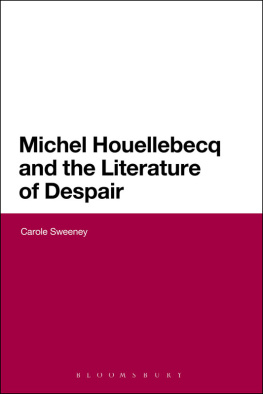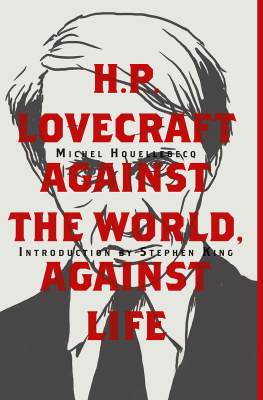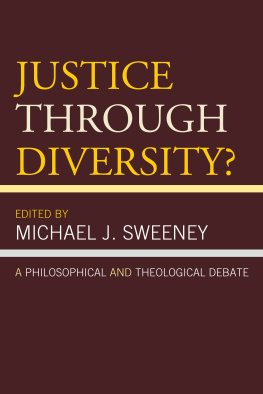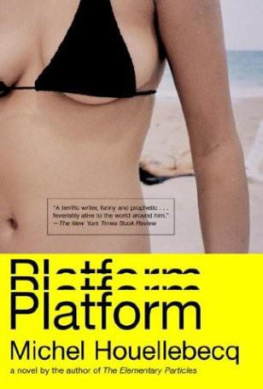Carole Sweeney [Sweeney - Michel Houellebecq and the Literature of Despair
Here you can read online Carole Sweeney [Sweeney - Michel Houellebecq and the Literature of Despair full text of the book (entire story) in english for free. Download pdf and epub, get meaning, cover and reviews about this ebook. year: 2013, publisher: Bloomsbury Publishing Plc, genre: Romance novel. Description of the work, (preface) as well as reviews are available. Best literature library LitArk.com created for fans of good reading and offers a wide selection of genres:
Romance novel
Science fiction
Adventure
Detective
Science
History
Home and family
Prose
Art
Politics
Computer
Non-fiction
Religion
Business
Children
Humor
Choose a favorite category and find really read worthwhile books. Enjoy immersion in the world of imagination, feel the emotions of the characters or learn something new for yourself, make an fascinating discovery.
- Book:Michel Houellebecq and the Literature of Despair
- Author:
- Publisher:Bloomsbury Publishing Plc
- Genre:
- Year:2013
- Rating:4 / 5
- Favourites:Add to favourites
- Your mark:
- 80
- 1
- 2
- 3
- 4
- 5
Michel Houellebecq and the Literature of Despair: summary, description and annotation
We offer to read an annotation, description, summary or preface (depends on what the author of the book "Michel Houellebecq and the Literature of Despair" wrote himself). If you haven't found the necessary information about the book — write in the comments, we will try to find it.
Carole Sweeney [Sweeney: author's other books
Who wrote Michel Houellebecq and the Literature of Despair? Find out the surname, the name of the author of the book and a list of all author's works by series.
Michel Houellebecq and the Literature of Despair — read online for free the complete book (whole text) full work
Below is the text of the book, divided by pages. System saving the place of the last page read, allows you to conveniently read the book "Michel Houellebecq and the Literature of Despair" online for free, without having to search again every time where you left off. Put a bookmark, and you can go to the page where you finished reading at any time.
Font size:
Interval:
Bookmark:

Michel Houellebecq and the
Literature of Despair
Also available from Bloomsbury
Novels of the Contemporary Extreme edited by Alain-Philippe
Durand and Naomi Mandel
Ethics and Desire in the Wake of Postmodernism by Graham Matthews
Bret Easton Elliss Controversial Fiction by Sonia Baelo-Allu
Toni Morrison and Literary Tradition by Justine Jenny Baillie
Salman Rushdies Cities by Vassilena Parashkevova
Michel Houellebecq and the
Literature of Despair
By Carole Sweeney

Contents
This book was made possible with the kind help and cheerful assistance of many friends and colleagues at Goldsmiths, Department of English and Comparative Literature, to whom I am immensely grateful.
Warmest thanks go to my brother and my colleague Marie-Claude Canova Green for their invaluable help with tricky translations; also to Jackie Clarke for providing me with a bracing reading list for May 1968 and to Carrie Hamilton for similar on sex tourism. Thank you to Sophie Corser for her top-notch editing skills and to Maria Lauret, Nicky Marsh and Tim Parnell for being such exacting and generous readers of my work and especially for the latters constant loving encouragement and forbearance.
This book is dedicated to my family: to my new and wonderful husband, to Tom and Monique, and to the memory of my father, 19202012. Lastly, it is for my beloved daughter, Pascale, who has grown into an adult over the course of its writing.
I am grateful to the following journals for their permission to reproduce earlier versions of some material in this book: Modern and Contemporary France , Natural Women? Anti-Feminism and Michel Houellebecqs Plateforme 20:3 (2012); Journal of Modern Literature And yet some free time remains.: Post-Fordism and Writing in Michel Houellebecqs Whatever , 33.4 (2010).
theres little point in denying that he has some profoundly fascistic tendencies [] Like Cline, hes a right-wing misanthrope who has produced a genuinely perceptive and resonant picture of French society obscenified and resonating.
In May 2000 a book appeared in British book shops with a cover featuring a half-naked woman staring dolefully into camera. Inscribed in gaudy embossed gold lettering across her naked breasts was a single word: atomised. The cover was in many ways puzzling, as the womans state of undress seemed to gesture to sex, or at least to some form of eroticism; but she appears uncomfortable, cold, even sullen, with her gaze turned reproachfully towards the reader. This unsettling combination of sex and dejection suggested by the cover of Michel Houellebecqs second novel Atomised ( This shift, one that is as much political as it is intellectual, is the subject of this book.
In France, the 1998 rentre littraire was dominated, overwhelmed even, by the rumpus around a single novel: Les Particules lemntaires . Le Monde devoted several front-page headlines detailing Houellebecqs dismissal from the editorial board of the literary review Perpendiculaire for serious ideological differences with his colleagues. The differences that troubled Perpendiculaire s editorial board would prove to be the same as those shaping the novels sharply divided reception in France, as reviewers and critics rapidly separated into two distinctly opposing camps over what Atomised might represent. It was either, they claimed, a deeply reactionary, splenetic treatise that implicitly endorsed the ills of contemporary society on the one hand, or a brilliantly sharp Balzacian social satire condemning these same ills on the other. Reaction to the novel was, as Marion Van Renterghem observed in Le Monde , extensive and intense: Rarely has a novel caused so much ink to flow, incited such passions, outbursts of anger and hate.
I will argue in this book that critical attention, positive and otherwise, and popular success have accrued to Houellebecqs novels in part because they can be read across the political spectrum, troubling all sides simultaneously. Putting his finger on a basic contradiction inherent in the liquid times of late capitalism, that is the ontological tension between moral and personal freedom and the intense commodification of all human life under such conditions, Houellebecq offers a withering critique of neoliberal late capitalism that never manages to extricate itself entirely from accusations of complicity with its object of scrutiny. His fundamental concern is the encroachment of capitalism in its neoliberal biopolitical form into all areas of affective human life; a thesis made explicit early in his oeuvre in Whatever where the narrator asserts that economic liberalism is an extension of the domain of the struggle, its extension to all ages and all classes of society.but finally struggles to envisage any space outside of that process where critical thinking might take place. Every last sphere of human thought and behaviour has been recuperated under the sign of exchange leaving humanity nowhere to go save for its own disappearance into a post-metaphysical desubjectivity.
Crossing ideological positions from right to left, the form as much as the content of Houellebecqs writing cannot easily be placed. Speaking directly to a moment in the late twentieth and early twenty-first centuries in its own modern stupid language, his novels can be read, on the one hand, as a reactionary response to the progressive socio-cultural movements of the twentieth century such as feminism and multi-culturalism while on the other, they seem to offer a compelling critique of the totalizing mechanism of the market with its hitherto unparalleled influence on human life. But it is difficult to separate these things out as Houellebecq seems to refuse to condemn properly, ideologically or ethically, what, on the surface, he appears to be critiquing. His writing is thus ideologically forked, as it seems to participate in, even approve of, the very world that it purports to condemn. Narrated in the idiom of its object of enquiry, the narrative elements in Houellebecqs novels are interposed with a series of (possibly) satirical structuring devices that are inconsistently and unevenly deployed in ways that frequently make any critical purchase on the subject matter, if not impossible, then extremely difficult. Herein, then, lies one of the most disquieting effects of his work as he manipulates, what Martin Crowley calls, a wilfully scandalous deployment of cultural material, slipping time and again between surface and depth, high and low, concern and indifference. Typically Houellebecqs prose moves between the serious, the introspective and the philosophical only to deflate this with the low comedy of le monde houellebecquien : the body, supermarkets and masturbation. The socio-cultural terrain of this world is shaped by reality TV, airport novels, fast food, pornography, short-term flexible working practices and even shorter-term sexual relationships. Discontented with such a world, Houellebecqs work suggests that if alienation is shown to be the condition of the everyday, it is the task of the novelist to show this in a correspondingly alienated language. If it is to say anything worthwhile, the novel must find its voice in the degraded cultural coinage of trash culture. Thus, the technique Houellebecq employs to show this thoroughly alienated world is to enact a banal, familiar, everyday non-literary language. Houellebecqs writing shows little sustained interest in formalistic concerns and certainly suggests that there is no aesthetic consolation to be had from good form.
Unallied then, to any genre or movement in contemporary French or European literature, each of Houellebecqs novels depicts what he calls the progressive suicide of the west. Little wonder then that Julian Barness back-cover blurb for Atomised claims that Houellebecqs novel hunts big game while others settle for shooting rabbits. Macho metaphors aside, this is a largely accurate assessment of Atomised s flawed but grand intellectual ambition in which the novel recounts this suicide in a text that runs an extensive gamut from philosophy, molecular science and post-industrial French history to forensically, even pornographically, detailed sex scenes, occasional ruminations on penis size and the joy of Monoprix food. To engage meaningfully with Houellebecqs vision one needs to be able to distinguish or differentiate between the low surface trashiness and the high intellectual stakes of his writing as the terrain of le monde houellebecquien is one where high and low cultures and discourses collide; where a prolonged cogitation on the agnosticism of modern France glides into a discussion of the merits of a particular supermarket ready-meal; forensically detailed pornographic descriptions nestle against eschatological treatises and scientific descriptions of mitochondrial DNA. Precisely the same flat narrative voice articulates the profound joy of watching pussy in motion in a tawdry Parisian peep show as discusses the imperative to decode the genome in evolutionary terms.
Font size:
Interval:
Bookmark:
Similar books «Michel Houellebecq and the Literature of Despair»
Look at similar books to Michel Houellebecq and the Literature of Despair. We have selected literature similar in name and meaning in the hope of providing readers with more options to find new, interesting, not yet read works.
Discussion, reviews of the book Michel Houellebecq and the Literature of Despair and just readers' own opinions. Leave your comments, write what you think about the work, its meaning or the main characters. Specify what exactly you liked and what you didn't like, and why you think so.













